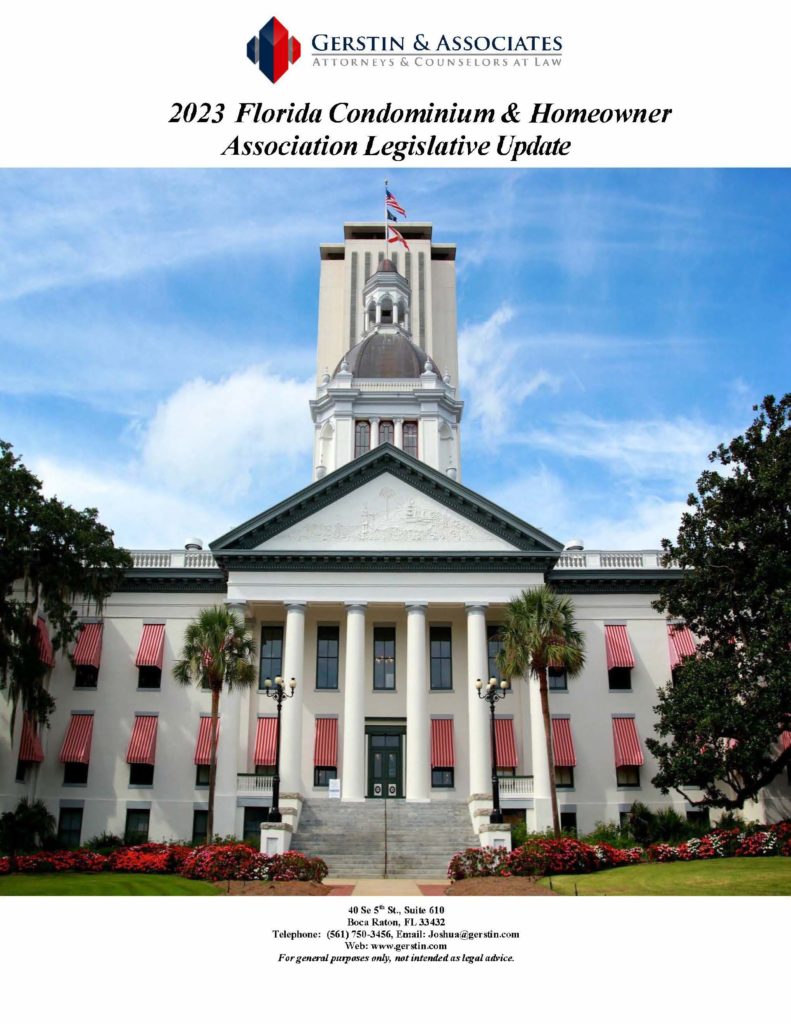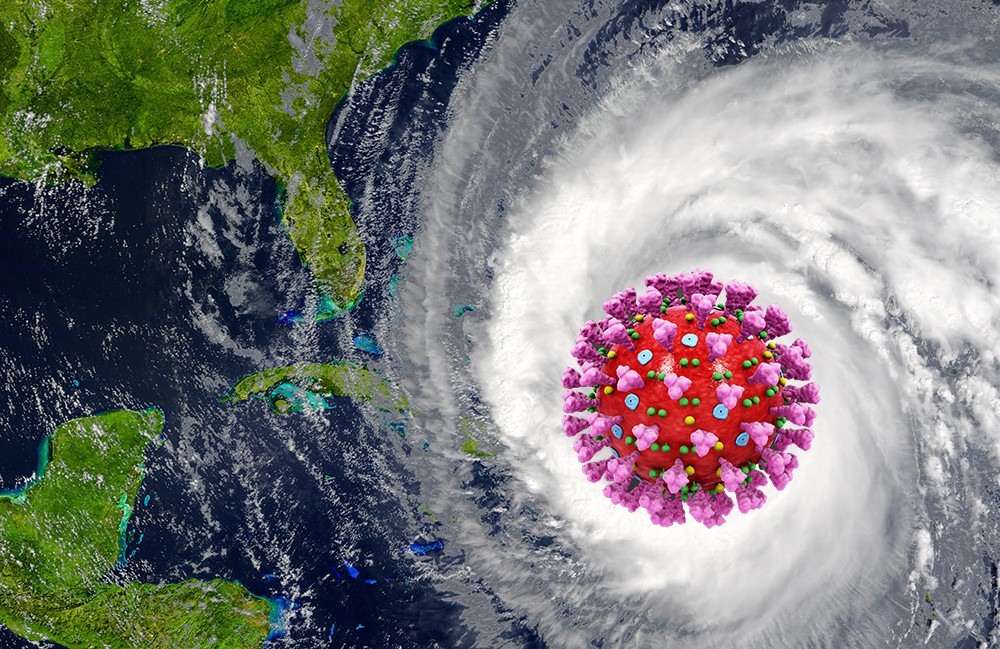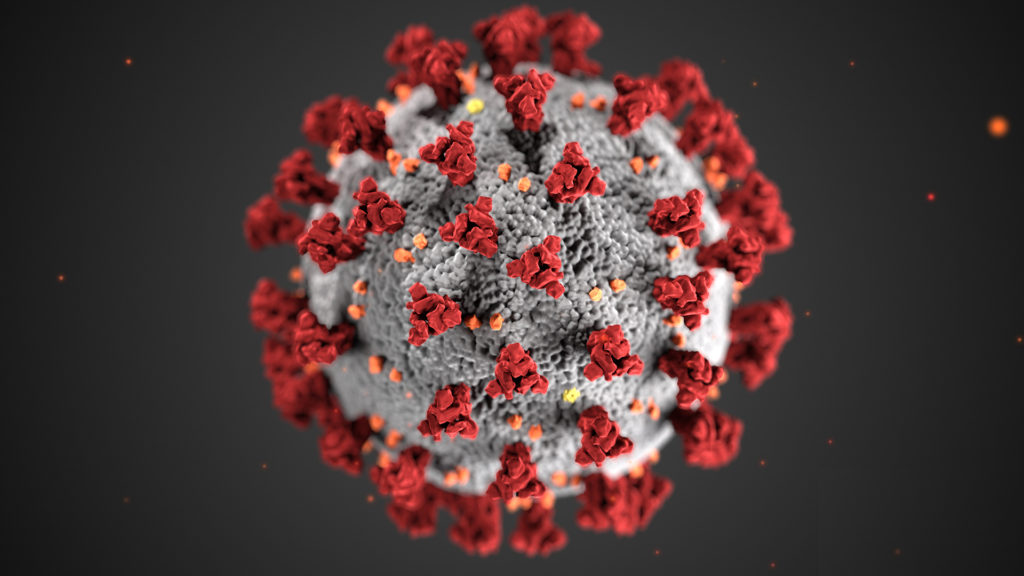Community Associations
2023 Florida Community Association Legislative Update

On May 5, 2023, Florida’s Legislature concluded its annual 60-day legislative session. Unlike previous legislative sessions, this year’s session garnered little media attention while the legislators were busy at work passing many laws impacting Florida’s community associations.
For the .pdf version of this article, click here.
Following is a list of the bills Governor Ron DeSantis recently signed into legislation:
1. Homeowner Associations. House Bill 919 (“Homeowners Association Bill of Rights”) (click here for the full bill). These laws will take effect on October 1, 2023.
Board meeting notices. All Board meeting notices must specifically list the meeting’s agenda.
Owner deposits. If a homeowners association collects a deposit from a member for any reason, including for a tenant or construction, and regardless if it is called a “security deposit,” the association must maintain all funds separately and not commingle them with association funds. Additionally, all funds deposited with the association must be returned within thirty days after receiving notice the reason for which the deposit was collected is complete. If requested by the owner, the association must provide an accounting of the funds deposited within seven (7) days of receiving the request.
Kickbacks. If an officer or director (or property manager) solicits or receives anything of value for him or his family from any person or entity providing goods or services to the Association may be immediately removed from the Board by the remaining Board of Directors. The violator is also subject to civil monetary fines. However, an officer, director, or manager may continue to accept food consumed at a business meeting with a value of less than twenty-five dollars ($25.00) per person or a service or good receipt in connection with the trade fair or education program.
Official Records. The law clarifies any parcel owner, or their authorized representative, may inspect Official Records.
Fines. The existing law was clarified to make it clear that fines may be levied for violations of the declaration, bylaws, or rules. Additionally, the notice to the member from the fining committee must include a description of the alleged violation, the specific action required to cure such violation, if applicable, and the date and location of the hearing. A parcel owner can attend a hearing by telephone or other electronic means. The letter from the finning committee after its hearing must include any applicable fines or suspensions the committee approved or rejected and how the parcel owner or any occupant, licensee, or invitee of the parcel owner may cure the violation, if applicable. All payments for fines are due within five days from the notice to the member.
Voting. Each of the following acts is considered a fraudulent voting activity and constitutes a misdemeanor of the first degree:
- Willfully and falsely swearing to, or affirming at oath or affirmation, or willfully procuring another person to falsely swear to, or affirm an oath or affirmation in connection with or arising out of, voting activities.
- perpetrating, or attempting to perpetrate, or aiding in the perpetration of, fraud in connection with a vote cast, to be cast, or attempted to be cast.
- Preventing a member from voting or preventing a member from voting as he or she intended, by fraudulently changing or attempting to change a ballot, ballot envelope, vote, or voting certificate of the member.
- Menacing, threatening, or using bribery or any other corruption to attempt, directly or indirectly, to influence, deceive, or deter a member when the member is voting.
- Giving or promising directly or indirectly anything of value to another member with the intent to buy the vote of that member or another member or to corruptly influence that member or another member in casting his or her vote. However, this does not apply to any food served which is to be consumed at the election rally or meeting or to any item of nominal value which is used as an election advertisement, including a campaign message designed to be worn by a member.
- Using or threatening to use direct or indirect force, violence or intimidation or any tactic of coercion or intimidation to induce or compel a member to vote or refrain from voting in an election or on a particular ballot measure.
2. Homeowner Associations. House Bill 437 (click here for the full bill). These laws took effect on July 1, 2023:
Flags. If displayed respectfully, a homeowner may display up to two (2) of the following flags:
- The United States flag.
- The official flag of the State of Florida.
- U.S. Army, Navy, Air Force, Marine Corps, Space Force, or Coast Guard flag.
- POW-MIA flag.
- A first responder flag.
Storage & Display of Items. An association may not restrict parcel owners or their tenants from installing, displaying, or storing any items on a parcel that are not visible from the parcel’s frontage or an adjacent parcel, including, but not limited to, artificial turf, boats, flags, and recreational vehicles.
3. Condominiums. Surfside “glitch” bill, reserves, and inspections. This legislation has already taken effect:
On June 9, 2023, Governor DeSantis signed the “glitch” bill to purportedly fix some issues with the recent “Surfside” related inspection law. The full text of the law is available here, and a .pdf of this portion of the article is available here. Unless otherwise indicated, this legislation takes effect immediately. As with many legislative efforts, determining the effectiveness of the legislation and the discovery of unintended consequences takes time. At the very least, the changes to the Structural Integrity Reserve Study law (SB 154) listed below are a good start:
Reserve Funding:
- Multi-condominium associations operating at least 25 condominiums can use a line of credit as an alternate funding source for reserve funding.
- Reserve funding must be based on the association’s most recent Structural Integrity Reserve Study.
- The requirements to waive reserves or use reserves for an alternate purpose (allowable only until 2025) has changed to a majority of the total membership from a majority of those present at a meeting in which quorum was attained.
- Inflation can be considered by an association when determining reserve funding.
- Depending on specific requirements, a 40 or 50-year certification may be used instead of the visual survey portion of a SIRS.
- The unduly harsh strict liability standard to find a director liable for a breach of fiduciary duty for not complying with the new reserve requirements has been changed. The new standard is now the more reasonable “willful and knowing.”
- Reserves are only required for components an association is responsible for according to its Declaration. Reserves are not needed for items whose useful life exceeds 25 years. However, deferred maintenance reserves for these items are still required.
- Along with architects and engineers, a reserve specialist can now perform the visual inspection portion of a SIRS.
- Exterior doors are now reserve components, and the floor and foundation are not unless the floor and foundation are part of the building’s “structure,” which, of course, they are.
Inspections:
- Insurance premiums are excluded from the 115% calculation that allows members to challenge a budget.
- The Florida Building Code is designated as authoritative to determine the height of a building.
- An association has a year or less (depending on local ordinances) to repair damage identified in an inspection.
- Fourteen days’ notice to members is required upon an association’s receipt from a local governing authority a milestone inspection is required. The notice must also include the date the milestone inspection must be completed.
- An architect and an engineer acting as a licensed design professional may conduct a milestone inspection.
- The definition of “substantial structural deterioration” was broadened to include “substantial structural weakness.”
- A local governing authority has the discretion to extend an inspection deadline for “good cause,” which at the least requires the association to have entered into a contract for a milestone inspection that cannot be completed by the deadline.
- No more than 45 days after receiving the inspection report from the architect or engineer, the association must post a summary on its website, mail it to the members, and make the summary or report available to renters.
- Community association managers no longer have to comply with the structural inspection laws solely because they manage a property “that has a building” on it.
- Local authorities can set a 25-year inspection requirement based on environmental conditions, such as proximity to a shoreline.
- Condominium units in which personal property is covered under a flood master policy or located above specific floors may not be required to have flood insurance.
- As of July 1, 2027, mediation is available to members for certain structural and life-safety disputes.
- Developers must provide prospective buyers with statements regarding milestone inspections, SIRS, and reserve studies, if applicable. The law introduces additional presale notice requirements in contracts to ensure buyer awareness.
4. Condominiums. Safety, Security and Crime Prevention. House Bill (HB) 837 overhauls Florida’s litigation landscape. The law is already in effect and is expected to reduce frivolous liability claims against residential associations (click here for full bill text):
When implemented by an association, the following safeguards exempt an association from liability if a third party commits a crime on their property:
- Security cameras at points of entry and exit that keep video retrievable for 30 days.
- Lighted parking available from dusk to dawn.
- Lighting in common areas, porches, walkways, and laundry rooms from dusk to dawn.
- Deadbolts measuring at least one inch on every door of every unit.
- Locking devices on every window and sliding door not used for community purposes.
- Locked gates at pool areas with fob or key access.
- Peepholes or viewers on doors that do not have windows or window next to doors
- By January 1, 2025, associations must have a Crime Prevention Through Environmental Design (CPTED) study performed by a law enforcement agency or a Florida Crime Prevention Through Environmental Design Practitioner (FCP). CPTED studies should be no older than 3 years old, and the association must substantially comply with the assessment.
- Associations must also provide their employees with safety and crime prevention training by January 1, 2025. This training must familiarize employees with security principles, devices, measures, and standards. After January 1, 2025, associations must train new employees within 60 days. The Florida Crime Prevention Training Institute of the Department of Legal Affairs will develop a proposed curriculum or best practices to implement the training.
Act Now!
Stay one step ahead of new legislation, recent case law, and new developments that may impact your community association by subscribing to the Gerstin & Associates newsletter.
Click Here to Subscribe to the Gerstin & Associates Newsletter
Fannie Mae’s Secret Blacklist of South Florida Condominium Associations.

In the wake of Surfside, some South Florida’s condominium associations cannot find lenders willing to lend for capital projects or to potential buyers. It’s doubtful South Florida’s condominium associations that restored, rehabilitated, and stabilized their operation can ever leave the list.
For more information:
Fannie Mae, Freddie Mac Keep Secret “Blacklist” of Properties (therealdeal.com)
Florida Condominium Living is About to Become Very Expensive.

–By Joshua Gerstin, Esq.
If you own a condominium in Florida, it is important to be aware of the significant cost increases condominium owners will face due to recent changes in Florida law and ever-increasing insurance premiums. In particular, the new Structural Integrity Law, with its mandated increases in reserve requirements and the skyrocketing cost of insurance, will cause many Florida condominium owners to sell their units and many condominium associations to pursue termination of their condominium associations.
The Structural Integrity Law was passed in response to the collapse of the Champlain Towers South condominium building in Surfside, Florida, in June 2021. The law requires all condominium associations in Florida to complete a structural inspection by a qualified engineer or architect and a reserve study by the end of 2021. Condominium associations are required to make any necessary repairs identified in the inspection.
The cost of the required inspections, reserve study and repairs can be significant. According to estimates from the Community Associations Institute, the cost of a structural inspection alone can range from $10,000 to $50,000 or more, depending on the size and complexity of the building. Repairs identified in the inspection can cost millions of dollars, and may require assessments or increases in monthly assessments to cover the costs.
In addition to the costs associated with the Structural Integrity Law, Florida condominium owners will also face increases in reserve requirements. The Structural integrity law prohibits the pooling of reserves for certain designated items or items identified as in need of repair by the structural inspection. Additionally, the law also removed the ability of condominium associations to partially fund or waive full funding of reserves.
The increase in reserve requirements will likely result in higher monthly assessments for condominium owners in associations that routinely chose not to fully fund their reserves. Condominium associations may need to levy special assessments to make up for any shortfall in reserve funds. These assessments can be a significant burden on condominium owners, particularly those who are already struggling financially.
Finally, condominium owners in Florida can expect to see exponential increases in their insurance premiums. Insurance companies are raising rates for condominium associations in response to the Champlain Towers South collapse and the resulting scrutiny of building safety and maintenance practices.
The new Structural Integrity Law, along with increases in reserve requirements and insurance premiums, will have a significant impact on the costs of owning a condominium in Florida. Condominium associations have options to mitigate these issues, but they have to act fast by taking steps NOW to ensure their condominium associations remain financially stable with a safe and secure living environment for their residents.
Act Now!
Stay one step ahead of new legislation, recent case law, and new developments that impact your community association by subscribing to the Gerstin & Associates newsletter.
Click Here to Subscribe to the Gerstin & Associates Newsletter
60 Minutes Segment on the Surfside Collapse.
Are the million-dollar PPP loans many PBC golf communities collected justified?
In the News:
Six golf country clubs in Palm Beach County – Hunters Run, Quail Ridge, Wycliffe, Old Palm, Banyan Cay and the Loxahatchee Club – may have received as much as $18 million in PPP loans through the Small Business Administration.
Six golf course communities are among the more than 3,000 businesses in Palm Beach County that received Payroll Protection Program (PPP) loans through the Small Business Administration (SBA).
An analysis of the loans released this week by the SBA shows that the six clubs may have received as much as $18 million. The SBA had been sued by a number of newspaper organizations over the identity of the loan recipients. When the applicants applied, they were told the loans would be public record.
The program was designed to keep employees on the payroll. If employers do that and comply with the loan conditions, the loans become grants and do not have to be repaid.
The SBA agreed to identify all recipients of loans in excess of $150,000 but only provided ranges of funds received, refusing to reveal the exact amount.
The data released by the SBA do not include the amount of the loan but rather the loan amount a bank has approved. The actual amount of a loan could be smaller than the approved amount. All amounts are in ranges.
Some golf course communities that accepted PPP loans in Palm Beach County have recently spent upward of $10 million on massive improvements to their clubhouses and golf courses.
The clubs that took the money include:
– Hunters Run ($2 million to $5 million) in Boynton Beach.
– Quail Ridge ($1 million to $2 million) in Boynton Beach.
– Wycliffe ($2 million to $2.5 million) in Wellington.
– Old Palm ($1 million to $2 million) in Palm Beach Gardens.
– Banyan Cay Resort Club ($700,000 to $2 million) in West Palm Beach.
– The Loxahatchee Club Homeowners Association ($150,000 to $300,000) in Jupiter.
Scores of other Palm Beach country clubs had applied for the PPP loans. Many were approved but decided to refuse to accept the money on both moral grounds and legal grounds after reading the fine print. Government auditors are expected to review how the money was spent and can ask for the money to be returned and penalties to be imposed if they find misrepresentations.
Fifty-seven country clubs in Florida accepted the PPP funds. According to CNBC, more than 400 country clubs and golf courses received loans throughout the country. The issue of whether it is appropriate for golf course communities to receive PPP loans has been debated.
Assessment revenue a factor
Joshua Gerstin, a Boca Raton lawyer who specializes in homeowner and condominium association law, said he expects one factor the SBA will consider is how much revenue a country club gets from its assessments.
“If it is mostly assessment driven, the country club might have a problem,” he said. “If members continued to pay their assessments, there was no real loss of revenue. But if much of it comes from dining and other sources that members pay outside of their assessments, they could be eligible.”
According to the SBA, businesses must certify that the loan is needed “to support ongoing” operations and that they are unable to access “other sources of liquidity” to support their ongoing operations.
Addison Reserve General Manager Michael McCarthy said once he and his board saw those revised requirements, they decided that it would be wrong to participate in the PPP program.
“There was no way I could certify that we needed it stay in business or that we didn’t have other sources of liquidity,” he noted.
Wycliffe, Quail Ridge: We preserved jobs
Hunters Run President Michael Soroka declined to comment on the issue. According to the SBA, Hunters Run and Banyan failed to provide data to indicate how many jobs were saved by the loans. Wycliffe was chastised on CNBC early Tuesday morning for accepting its loan. The Post has learned that the Wycliffe loan amount was $2 million. It was able to preserve 281 jobs. Wycliffe’s general manager, Rob Martin, released a statement to The Post that read:
“At Wycliffe, we are thankful to all of our employees for their hard work and dedication through these challenging times. We took PPP money because we care deeply about our team and wanted to make sure that we had the ability to provide them a regular paycheck. Following the legal parameters, we only requested and received enough to cover our payroll needs and did not use our loan in any way to disadvantage other companies. We are thankful that we qualified to receive money so that our employees and their families could make ends meet during these challenging times.”
Quail Ridge GM William Langley said the PPP loan was used as intended. He noted that Quail Ridge would have had to have laid off many of its 300 employees without the loan. “We are not a club with deep pockets,” he said.
The Club at Admiral’s Cove in Jupiter was one of those that returned the funds – $3.1 million. “We saw too many issues, both moral and legal,” said CEO Bret Morris. “We did not want to take the risks.” He said Admiral Cove was able to keep its 500 employees working, noting: “We found other things for them to do.”
2020 Hurricane Season, the Definitive Checklist for Florida’s Community Associations.
 – By Joshua Gerstin, Esq.
– By Joshua Gerstin, Esq.
(Click here for .pdf version with “checkable” fields for your ease of use!)
Hurricane season begins on June 1st and lasts 5 months, with storms typically peaking in August and September. Due to COVID-19, this hurricane season will be unlike all others. Properly preparing for this unique hurricane season could truly be a lifesaver. The following hurricane preparation checklist is a combination of over twenty years of community association legal experience and new COVID-19 precautions:
Things to do now:
COVID-19 Related Hurricane Checklist:
— Start stocking up on cleaning supplies now. Most stores have limited cleaning supplies or only allow a limited number of purchases. It is going to take a lot longer to obtain all the cleaning supplies you will need.
— An abundance of hand Sanitizer, soap, disinfectant spray, disinfectant wipes and face masks are the COVID-19 supplies your community association will need if a hurricane strikes.
— Plan for extended power outages (generator fuel, ice, flashlights, extra petty cash and installing a landline). Although FPL has been burying power lines and improving the electrical grid, additional workers will be needed to restore power after a hurricane. COVID-19 testing of these workers will cause delays and will limit the size of this additional workforce as infected workers are turned away.
— Purchase locks and non-electronic security equipment to keep buildings and common areas secure from vandalism or looting during an extended power outage.
— Go to the app store for your mobile phone and download the official FEMA app. A face-to-face meeting with an adjuster after a hurricane strikes is unlikely. FEMA has made available a phone app that can allow insurance companies to provide estimates without an in-person visit. When the app is running, it can take photos and measurements and gather additional information as you walk through your common areas.
— Confirm shelter locations, evacuation routes and remind residents to take their pets if they evacuate. Due to COVID-19 shelters and evacuation routes across Florida have changed. Officials are considering protocols for shelters that range from separating people based on temperature checks to non-congregated sheltering in hotels. Direct residents to https://www.cdc.gov/disasters/hurricanes/covid-19/public-disaster-shelter-during-covid.html for further information about staying virus free in a shelter.
— Establish a designated area that allows for social distancing where residents can meet for more information after the disaster.
— Inform residents in writing the extent of help the association will be providing (and not providing) during and after a hurricane. Urge your residents to begin their own preparation and evacuation plans.
— Update your contact list of owners, board members and staff. Ensure the list contains the correct contact information for seasonal residents. Print out the list and place it in a safe location (having it on your computer will do you no good when the power is out).
— Similar to the children’s game “telephone”, establish amongst the board of directors a chain of command for communications in the event a hurricane strikes. When a hurricane strikes, time should not be wasted by having to contact each board member or answer each board member’s non-emergency information inquiry.
— Update your vendor list, print it out and place it in a safe location (having it on your computer will do you no good when the power is out).
— Ensure your building’s plans and blueprints are in a safe location with easy access for first responders or insurance agents. Highlight shut-off valves, power-boxes, lift stations and debris staging areas.
— Service your association’s lift stations now to avoid sewage overflow if a hurricane strikes.
— Confirm all of your association’s data is being regularly backed up to the cloud or offsite.
— Copies of your association’s insurance policies, claims filing information and insurance agent’s contact information should be in paper form and secured in a safe location.
— Keep handy a list of all bank account numbers, branch locations and authorized association signatories. Have the board authorize an increased petty cash amount to be stowed away with your hurricane supplies. Credit cards, debit cards and computer checks will not be available if the power is out.
— Enter into contracts with vendors you will use during an emergency (water removal, debris cleanup repairs, etc.) to ensure they are available immediately after an “all clear” is given. Hurricane Irma struck during the same season a hurricane hit Puerto Rico and Texas. Many community associations were unable to secure vendors for the cleanup of debris and water because their vendor was assisting with other hurricanes.
— Pre-determine a staging area for debris and contract for debris dumpsters.
— Print out the instructions for updating the Association’s website and keep them in a safe location. Designated a member or director to provide frequent website updates regarding your association after a hurricane strikes. Off-site or seasonal residents will be searching for information and you do not want them contacting management if possible.
— Print out the instructions for updating the Association’s voicemail and keep them in a safe location. Residents and their loved ones will be calling for information and your association’s outgoing message on its voicemail is an effortless way to keep them updated.
— Make plans to shut down and secure clubhouses and other amenities, store furniture and to shutoff electric and water.
— Confirm all drainage areas and lines are working at full capacity.
— With proper socially distancing, establish a designated area within the association for posting hurricane-related updates.
— If you have a manned gate, make sure the attendants and the residents know at what point the attendants will be sent home and that the gates will be locked in the open position to provide emergency ingress and egress.
— Buy battery operated walkie-talkies and consider having a landline installed. Past hurricanes have taught us battery-operated walkie-talkies and a landline are the only communication methods that can be relied on if the power goes out.
— Stock up on and securely store gasoline, tarps, duct tape, sandbags, submersible water pumps, chain saws, water, flashlights, weather radio, batteries, and a video camera for documenting storm damage.
— Consult your elevator company on how to properly secure your association’s elevators.
— Ensure you have keys to each unit in your building.
— Have your Association’s trees trimmed, including the removal of all coconuts, seeds or potential hurricane “missiles”.
— Have all dead and dying trees removed. Consider waiting to replant any new trees until after the hurricane season. All new trees should be firmly staked and secured
— Identify residents who need special care and contact those owners and their families to determine if arrangements have been made for them. Remind all residents the elevators may need to be shut down or may not operate for an extended period due to a power outage.
— Inform residents in writing what to expect from the association before, during and after a hurricane strikes. Advise residents to communicate with friends and relatives elsewhere who will be concerned. Association offices oftentimes become overwhelmed after a storm with relatives calling from out of state to check on them. In the event of a mandatory evacuation, remind owners to keep all receipts related to additional living expenses, such as hotel accommodations and gasoline if an evacuation is mandated. These receipts may be reimbursable as part of an eventual insurance claim.
When a hurricane warning has been issued:
— Bring all objects inside that may be tossed about by wind or rain.
— Check all drainage areas and remove any debris that would restrict water flow.
— Lower the water in all pools, fountains and other water features.
— Shut down, close and securely lock all pools, water pumps (pools, fountains irrigation, etc.) and recreation areas.
— Videotape or photograph the building and all common areas with a date stamp to accurately document the property’s pre-storm condition for insurance purposes.
— Ensure all construction dumpsters are empty. If possible, arrange to have your regular dumpster emptied.
— Strategically place sandbags in areas where flooding is anticipated.
After the hurricane has passed:
— Stay calm, triage the association and focus only on life/safety issues.
— After the life safety issues are stabilized, focus on damage mitigation and recording the remediation work with photographs and video. Contact your vendors to come into the association to begin removing debris and items that are wet (drywall).
— Consider shadowing contractors and vendors as they inspect or work on individual units to avoid stolen property claims later.
— Continue documenting and recording the damage and remediation efforts for insurance purposes.
— In times of need, unscrupulous people always try to take advantage. Avoid vendors, contractors and third-party/private insurance adjusters soliciting your association’s business. If you have no choice, take the time to fully vet each one before signing anything.
— With the assistance of an attorney experienced in community association hurricane claims (joshua@gerstin.com), contact and file a claim with your association’s insurance carrier.
Click here for .pdf version with “checkable” fields for your ease of use!
Stay Informed!
Click Here to Subscribe to the Gerstin & Associates Newsletter
Florida Community Associations, Disclosing the Names of the Infected.
– Disclosing the Names of Infected Members in Florida’s Community Associations.
By: Joshua Gerstin, Esq. (click here for .pdf version)
If a community association is aware a member has the coronavirus, the first step for the association should be to alert its members without naming the infected member(s). In this initial alert, the Association should remind its members to follow the guidelines of the local governing authorities and the CDC regarding staying healthy during this pandemic (washing hands, social distancing, etc.). After sending the initial alert, determining whether the association can or must disclose the identity of an infected member is the troublesome next step. Although this issue has not been decided by the courts or an administrative agency yet, there are various laws governing the disclosure of confidential medical information Florida’s community associations should familiarize themselves with.
The most widely known law covering medical information confidentiality is the federal Health Insurance Portability and Accountability Act known as “HIPPA”. According to HIPPA, community associations do not qualify as a “covered entity” (ex. doctor’s office, etc.). As such, HIPPA generally does not apply to most of Florida’s community associations. However, Florida Statute §456.057 entitled Ownership and Control of Patient Records; report or copies of records to be furnished; disclosure of information (“Florida Medical Records Act”) and Florida Statute §720.303(5)(c)(4) (for homeowner associations) or §718.111(12)(c)(3)(d) (for the condominium associations) pertain to medical records within an association’s Official Records and may apply if the association has possession of the owner’s medical records indicating he/she is infected. Based on a “strict reading” it is reasonable to conclude these Florida statutes ( §720.303(5)(c)(4), §718.111(12)(c)(3)(d) and §456.057) prohibit a community association from disclosing the identity of an infected member when knowledge of the infection was obtained from information contained in the infected member’s medical records.
In most instances, a community association will not be in possession of medical records indicating a diagnosis of infection. Often times, an association will learn a member is infected from the inadvertent or purposeful disclosure by a care provider. In such instances, the association should determine whether the sick member authorized the disclosure to the association. If so, the association should ask the sick member for written authority to disclose the information identifying him/her as having the coronavirus. Without written approval from the sick member, the purposeful or inadvertent disclosure by a medical professional of an infection does not give the association the ability to broadcast the same information to all of its members free from liability for its actions.
Most often, the association will have third or fourth hand information from an owner who knew or saw something leading them to conclude a member has been infected. Broadcasting such information to other members, although it may seem at least anecdotally accurate, will subject the association to liability.
Some alternative approaches to disclosing the name of the infected member(s) are:
1. Contacting the local health authorities and obtaining their opinion as to whether this person, based on the surrounding demographic, should be brought to a hospital for quarantine or what steps the person and the association should take.
2. Contact the individual to determine whether he or she would consent in writing to the disclosure of the infection. If the answer is yes, no problem, the association can disclose.
3. The Association should determine whether the individual and the in-home care givers are both isolating in the home and not going outside other than in their backyard or on their balcony. The association should routinely check-in with the person/caregivers via telephone and driving by as much as practical. Many condominium associations have security cameras that can monitor whether the infected member has left his/her unit and entered a common area or came into contact with a common element (ex. elevator). The Association should continue this for the longest maximum time the CDC states a person is infectious. If an infected member flouts the CDC isolation guidelines, the police and local health department should be notified and asked to take action. Relaying this health related information regarding an infected member to the health or police authorities would most likely not violate the above cited laws.
4. Florida’s condominium associations should enact an action plan for banning any infected members from using the common areas and common elements (if they are not closed already). These plans should be done at a meeting of the board of directors with its attorney that is closed to the membership due to the discussion of medical information and anticipated litigation. However, the infected member(s) cannot be denied ingress or egress to their units/homes. Therefore, especially in Florida’s condominium associations, a plan for extra, sustained cleaning of all common elements (ex. elevators) and common areas are a must.
Community association members, especially those in 55+ communities, are rightfully afraid of catching the coronavirus. As we become aware of the increasing amount of infections, community association members will demand their associations release the names of the infected with impassioned pleas for their own safety. When this happens at your community association, your initial focus should be on alerting members to the many ways they can protect themselves while consulting with the association’s attorney and local health professionals in the development of an action plan.
Stay Informed!
Click Here to Subscribe to the Gerstin & Associates Newsletter
Coronavirus & Florida Community Association Emergency Powers.
How Florida’s Emergency Power Statutes Can Help Keep Your Community Safe.
Both President Trump and Governor DeSantis invoked states of emergency and triggered the statutory emergency powers for Florida’s community associations. Found in Sections 718.1265, and 720.316 of the Florida Statutes, these emergency powers were enacted with hurricanes in mind. However, the statutes apply whenever a national or state emergency is declared. As such, these emergency powers can assist community associations in their fight against the spread of the Coronavirus. Below is the statute with certain parts highlighted in bold you may find useful for your community association. Although the statute set forth below is the version for condominium associations, an identical version applies to homeowner associations. As always, speak with your association’s attorney before implementing any of these statutory emergency powers and follow the most updated directives from your local health officials.
718.1265 & 720.316?Association emergency powers.— (click here for HOA version)
(1) To the extent allowed by law and unless specifically prohibited by the declaration of condominium, the articles, or the bylaws of an association, and consistent with the provisions of s. 617.0830, the board of administration, in response to damage caused by an event for which a state of emergency is declared pursuant to s. 252.36 in the locale in which the condominium is located, may, but is not required to, exercise the following powers:
(a) Conduct board meetings and membership meetings with notice given as is practicable. Such notice may be given in any practicable manner, including publication, radio, United States mail, the Internet, public service announcements, and conspicuous posting on the condominium property or any other means the board deems reasonable under the circumstances. Notice of board decisions may be communicated as provided in this paragraph.
(b) Cancel and reschedule any association meeting.
(c) Name as assistant officers persons who are not directors, which assistant officers shall have the same authority as the executive officers to whom they are assistants during the state of emergency to accommodate the incapacity or unavailability of any officer of the association.
(d) Relocate the association’s principal office or designate alternative principal offices.
(e) Enter into agreements with local counties and municipalities to assist counties and municipalities with debris removal.
(f)?Implement a disaster plan before or immediately following the event for which a state of emergency is declared which may include, but is not limited to, shutting down or off elevators; electricity; water, sewer, or security systems; or air conditioners.
(g) Based upon advice of emergency management officials or upon the advice of licensed professionals retained by the board, determine any portion of the condominium property unavailable for entry or occupancy by unit owners, family members, tenants, guests, agents, or invitees to protect the health, safety, or welfare of such persons.
(h) Require the evacuation of the condominium property in the event of a mandatory evacuation order in the locale in which the condominium is located. Should any unit owner or other occupant of a condominium fail or refuse to evacuate the condominium property where the board has required evacuation, the association shall be immune from liability or injury to persons or property arising from such failure or refusal.
(i) Based upon advice of emergency management officials or upon the advice of licensed professionals retained by the board, determine whether the condominium property can be safely inhabited or occupied. However, such determination is not conclusive as to any determination of habitability pursuant to the declaration.
(j) Mitigate further damage, including taking action to contract for the removal of debris and to prevent or mitigate the spread of fungus, including, but not limited to, mold or mildew, by removing and disposing of wet drywall, insulation, carpet, cabinetry, or other fixtures on or within the condominium property, even if the unit owner is obligated by the declaration or law to insure or replace those fixtures and to remove personal property from a unit.
(k) Contract, on behalf of any unit owner or owners, for items or services for which the owners are otherwise individually responsible, but which are necessary to prevent further damage to the condominium property. In such event, the unit owner or owners on whose behalf the board has contracted are responsible for reimbursing the association for the actual costs of the items or services, and the association may use its lien authority provided by s. 718.116 to enforce collection of the charges. Without limitation, such items or services may include the drying of units, the boarding of broken windows or doors, and the replacement of damaged air conditioners or air handlers to provide climate control in the units or other portions of the property.
(l) Regardless of any provision to the contrary and even if such authority does not specifically appear in the declaration of condominium, articles, or bylaws of the association, levy special assessments without a vote of the owners.
(m) Without unit owners’ approval, borrow money and pledge association assets as collateral to fund emergency repairs and carry out the duties of the association when operating funds are insufficient. This paragraph does not limit the general authority of the association to borrow money, subject to such restrictions as are contained in the declaration of condominium, articles, or bylaws of the association.
(2) The special powers authorized under subsection (1) shall be limited to that time reasonably necessary to protect the health, safety, and welfare of the association and the unit owners and the unit owners’ family members, tenants, guests, agents, or invitees and shall be reasonably necessary to mitigate further damage and make emergency repairs.
Educational purposes only. Not meant for legal advice, please consult your attorney for legal advice.
Stay Informed!
Click Here to Subscribe to the Gerstin & Associates Newsletter
Gerstin & Associates
40 SE 5th St., Suite 610
Boca Raton, FL 33432
Telephone: (561) 750-3456
Fax: (561) 750-8185
Email: joshua@gerstin.com
Web: www.gerstin.com
Update. Florida Vacation Rental Bill SB1128 Amended to Protect Community Associations
 No longer do Florida’s homeowner and condominium associations have to worry they are losing the ability to regulate vacation rentals. The ability of homeowner of condominium associations to limit or restrict vacation rentals such as Airbnb and VRBO is reestablished in a recently filed and approved amendment to SB1128 with the addition of the following provision:
No longer do Florida’s homeowner and condominium associations have to worry they are losing the ability to regulate vacation rentals. The ability of homeowner of condominium associations to limit or restrict vacation rentals such as Airbnb and VRBO is reestablished in a recently filed and approved amendment to SB1128 with the addition of the following provision:
“ The application of this act shall not supersede any current or future declaration or declaration of condominium adopted pursuant to chapter 718, Florida Statutes, cooperative documents adopted pursuant to chapter 719, Florida Statutes, or declaration of covenants or declaration adopted pursuant to chapter 720, Florida Statutes.”
Click here to read the original bill and click here to the recent amendment. SB2118 remains in committee and has a long way to travel before it reaches the Governor’s desk.


